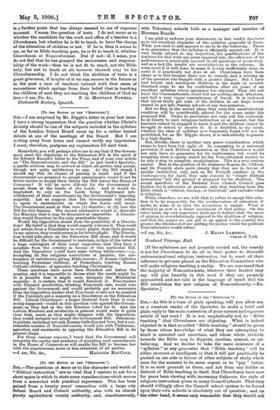[To THE EDITOR OP TEE " SPEOTATOR."I SIR,—The questions at
issue as to the character and worth of "Biblical instruction" are so vital that I venture to ask for a short space in which to state some considerations which accrue from a somewhat wide practical experience. This has been gained from a twenty years' connection with a large city School Board and Council authority, also with an almost purely agricultural county authority, and, simultaneously, with Voluntary schools both as a manager and member of Diocesan Boards.
I am glad to endorse your statements in last week's Spectator as to the excellent character of the syllabus generally in force. What you omit to add appears to me to be the following. There is no guarantee that the syllabus is efficiently carried out. It is very rarely subject to any inspection, the qualifications of the teachers for this work are never inquired into, the efficiency of its performance is practically ignored in all questions of promotion, and as a fact the results are unsatisfactory in the extreme. In some cases it is well done, in many it is very inefficiently done, in some it is practically not done at all. Churchmen have been silent as to this because there was no remedy, and a stirring up of the question was fraught with a greater danger. But I have had bright and intelligent children in the sixth or seventh standard come to me for confirmation after six years of an excellent syllabus whose ignorance was abysmal. They did not know the Commandments, could tell me nothing about Abraham, and had a very vague remembrance of David. It is reckoned that about thirty per cent. of the children in our large towns cannot be got into Sunday schools of any denomination. But we find, in the second place, that even this unsatisfactory condition will be considerably altered for the worse under the proposed Bill. Under its provisions not only will the authority be at liberty to omit religious instruction as at present, but the teachers cannot be engaged to teach it and the children cannot be brought to school to receive it. It is doubtful, to my mind, whether the class of syllabus now frequently found will not be prohibited, for, as Mr. Diggle shows, it is undoubtedly dogmatic, to a high degree.
But, thirdly, there is another very grave consideration which seems to have been lost sight of. In consenting to a universal provision of such Biblical instruction as this Churchmen would not only have no guarantee for its continuance, but would be accepting what is openly stated by the Nonconformist leaders to be only a step to complete secularisation. This is a very serious matter. Men in the position of Dr. Guinness Rogers, Dr. Clifford, and Dr. Forsyth state quite clearly that they are in favour of secular instruction only, and, as Dr. Forsyth explains in the Contemporary for April, they only consent to "simple Biblical instruction" till the ground is prepared for its abolition. The recent manifesto of the National Free Church Council goes further, for it advocates at present only that teaching from the Bible which is "ethical, literary, or historical," and excludes what is religious.
When, therefore, we are told that to refuse to accept this solu- tion is to be responsible for the secularisation of education, it seems to some of us that the accusation is unjust. What is offered to us now is a direct instalment of that policy. On the other hand, my own experience leads me to believe that the mass of opinion is overwhelmingly opposed to the abolition of religion, and that the nearer we can get to an appeal to the country the greater the likelihood of our getting the justice which the political Nonconformists would refuse.
—I am, Sir, Ste., J. MALET LAMBERT,
Newland Vicarage, Hull. Canon of York.
[If the syllabuses are not properly carried out, the remedy is not for Churchmen to do all in their power to discredit undenominational religious instruction, but to exert all their influence to get men placed on the Education Committees who will make religious teaching a reality. We are convinced that the majority of Nonconformists, whatever their leaders may say, will join heartily in this work if they are properly approached, and not told in the language of insult that the Bill establishes the new religion of Nonconformity.—En. Spectator.]








































 Previous page
Previous page